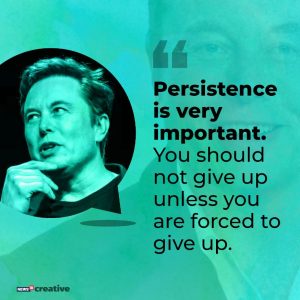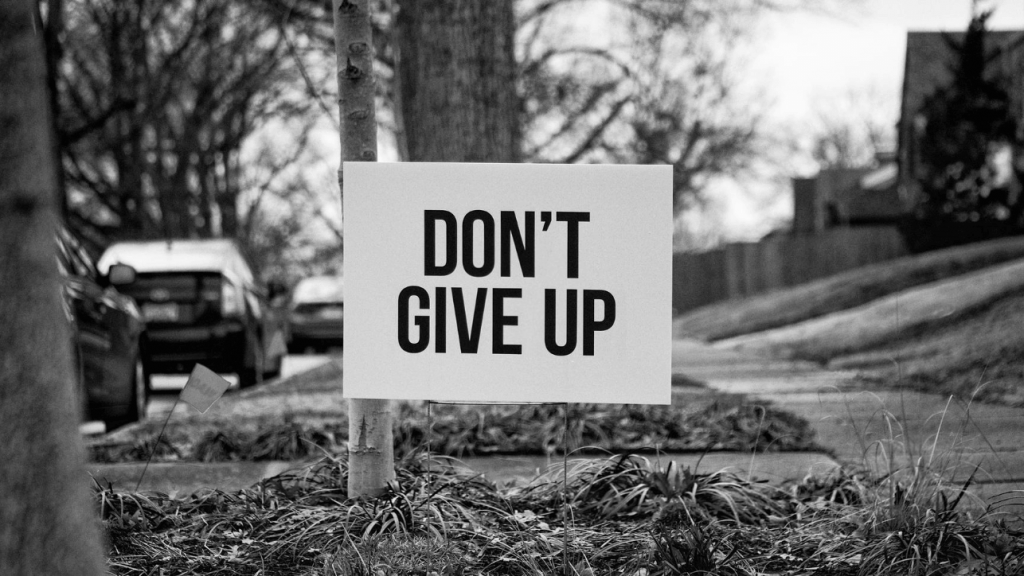It’s new year’s day – another day to set resolutions.
“I am going to lose weight.”
“I will quit smoking.”
“I will get that job.”
“I am going to start a business.”
The list goes on. You are highly motivated to work on your resolution at the beginning of the year. Few weeks pass by. You lose motivation. Everything goes back to the way it was. You haven’t lost any weight. You have started smoking again and you are still out of work.
Why is it that we cannot stick to our resolutions or any long-term goals in life?
It is because we lack PERSISTENCE.
What is Persistence?
Persistence is – to continue working on something in spite of the difficult circumstances.
We often hear motivational speakers say things like;
“Work hard.”
“Never give up.”
“Winners never quit.”
“Stay focused.”
“Avoid distractions.”
All of them are trying to say the same thing, which is – be persistent.
Persistence is the key to success. But, in order to be persistent, first, you should be clear about what you are trying to accomplish in life. What is it that you really want? After clarifying the desire that you are trying to accomplish, you must work towards achieving it with persistence.
The very first chapter of the book Think and Grow Rich is “Desire”. Without desire, there is really nothing to work towards. So rephrasing the previous statement, it is actually that desire and persistence are what lead to success.
Staying Persistent
Staying persistent is easier said than done. Just like in the previous example of new year’s resolutions, very few people are able to really stay persistent and work towards their goals. That is why only a few people succeed and others fail.
Think about a time when you really wanted to achieve something. Maybe it was to score good grades in an exam, get a job promotion, or nail that presentation. You worked really hard to achieve it. Maybe you spent all week working on it with zero distraction. You kept going. In the end, it all paid off. You got what you wanted.
I have got many such experiences. Whenever I stay focused without distractions towards a single task, I usually get the job done with my best potential. But these examples are for short-term goals. What about the long-term goals?
The 2-Minute Rule
I heard about the “2-Minute Rule” from a YouTube video I was watching the other day. After further research, I found out that this rule is apparently from a book called Atomic Habits by James Clear.
The “2-Minute Rule” is basically a concept that says that you can set a new habit by only giving two minutes of your time every day. How? Suppose you want to start reading every day but somehow, you can’t stay focused or make it a consistent habit. The rule suggests that you read a book for only 2 minutes and stop it after the 2 minutes are over. Within the 2 minutes, maybe you can finish reading a page from the book. Do the same thing again the next day. And continue the same every day until it becomes a habit. Eventually, you will become a consistent book reader. Once it becomes a habit, the 2 minutes will increase to 30 minutes. Then, it will become an hour and even more.
The “2-Minute Rule” is a perfect example of persistence. So if you want to lose weight, just exercise for 2 minutes every day. But, never skip a day. Eventually, you will start exercising consistently and your goal will be accomplished.
Persistent People Succeed
Think about all the successful people you know, whether it be Elon Musk, Bill Gates, Steve Jobs, Warren Buffett, or Jeff Bezos. They were all clear about what they wanted to achieve and they were persistent to work towards their goals. Elon Musk has famously said that if you put in 80 to 100-hour workweeks and other people are putting in 40-hour workweeks, and you are doing the same thing, you will definitely achieve more than other people. When Bill Gates and Warren Buffett were asked to write down what their secret to success was, they both wrote down the word FOCUS, without knowing what the other one was writing.

Albert Einstein was persistent and worked on his problems more. As a result, he found exactly what he was looking for. Thomas Edison failed a lot before he finally invented the light bulb. If it were anyone else, he would have given up after failing a few times. It was persistence that made Edison successful. There are a lot of examples of people who failed but never gave up. The point is – persistence matters. Don’t give up because you failed. Learn from failures and work again.
The concept of persistence applies to everyone, regardless of what you do. All you have to do to stay persistent is to show up and never quit.
“Patience, persistence, and perspiration make an unbeatable combination for success.”
-Napoleon Hill




